The Thackery Journal Read online
The Thackery Journal
John Holt
Phoenix Publishing – Essex - UK
© John Holt - August 2013
Cover Image
The cover image shows the Battle of Antietam: the first major battle of the American Civil War to be fought on Northern soil. The Battle of Antietam also known as the Battle of Sharpsburg, particularly in the South, was fought on Wednesday, September 17th 1862, near Sharpsburg, Maryland, and Antietam Creek, as part of the Maryland Campaign. It was the bloodiest single-day battle in American history, with 22,717 dead, wounded and missing on both sides combined.
The image shows the Union advance on Dunker Church at Antietam, blocking the Army of Northern Virginia’s advance into Maryland. The white German Baptist Church is visible in the background in this 1887 painting called "Battle of Antietam" by Thure de Thulstrup.
It was published on December 19th 1887 by L Prang & Co., Boston. It is registered with the Library of Congress - Reproduction Number: LC-DIG-pga-04031 (digital file from original print. There are no known restrictions on publication.
Conditions of Sale
John Holt has asserted his right under the Copyright, Designs and Patents Act 1998 to be identified as the author of this work.
All rights reserved. No part of this publication may be reproduced, stored in a retrieval system, or transmitted in any form or by any means, electronic, mechanical, photocopying, scanning, recording or otherwise, without the prior permission of the publisher, except by a reviewer who may quote brief passages in a review to be printed in a newspaper, magazine or journal.
This book has been sold subject to the condition that it shall not, by way of trade or otherwise, be lent, resold, hired out, or otherwise circulated without the publisher’s prior consent in any form of binding or cover other than that in which it is published and without a similar condition including this condition being imposed on the subsequent purchaser.
British Library Cataloguing In Publication Data .
A CIP catalogue record for this book is available from the British Library
Printing History
This edition was published by Phoenix, Essex, UK, in August 2013
ISBN
978-1-291-51749-1
Preface
On the night of April 14th 1865 President Abraham Lincoln attended a performance at The Ford Theatre, in Washington. A single shot fired by John Wilkes Booth hit the President in the back of the head. He slumped to the floor, and died a few hours later without regaining consciousness. Was Booth a lone assassin? Or was he part of a wider conspiracy? A plot hatched by his own generals to replace Lincoln with General Ulysses S. Grant.
* * *
Although this story concerns itself with the War between the States, and the momentous events that occurred just after the Civil War ended, the story is completely fictitious, and has no basis in fact. Although the story makes use of certain actual events, places and people, it does so purely for its own purpose, and nothing more. Of the main characters, only three actually existed – President Abraham Lincoln, his assassin John Wilkes Booth, and General Ulysses S. Grant. Those three names are the only real characters in this story. Many of the towns, and places within those towns are real, although not necessarily in the way described. Several other areas have been merely created to serve the needs of this story.
All other characters in this publication are fictitious and any resemblance to real persons, living or dead is purely coincidental.
It is acknowledged that use has been made of the web site of West Virginia Archives and History in connection with the battle of Corinth and Shiloh, and their permission is appreciated.
It is also acknowledged that use has been made of Wikipedia.
I am grateful to Lauren Ridley, of Cherryloco Jewellery for allowing me to base the Phoenix logo on her design.
Once again my sincere thanks go to Michael and Barbara Morton for their un-tiring work in checking the formatting of the manuscript.
John Holt
“Four score and seven years ago our fathers brought forth on this continent, a new nation, conceived in Liberty, and dedicated to the proposition that all men are created equal.”
“Now we are engaged in a great civil war, testing whether that nation, or any nation so conceived and so dedicated, can long endure.”
“…that we here highly resolve that these dead shall not have died in vain; that this nation shall have a new birth of freedom; and that this government of the people, by the people, for the people, shall not perish from the earth.”
November 19, 1863 – President Abraham Lincoln’s Gettysburg Address
PART ONE
_______________________
HOPES AND DREAMS
Chapter One
January 1866 - The Journal
The room was now quite dark. Faint shafts of moonlight that filtered through the heavy muslin curtains did nothing to penetrate the overall gloom. But it wasn’t merely the lack of light that made the room dark and gloomy. There was something else, something intangible. Something was missing. Not an object. It was more like a feeling, a sensation. The room lacked warmth. It lacked hope. But more than that, the room lacked something much more important. It lacked life itself.
* * *
Although reasonably large, the room was sparsely furnished. It had not always been like that. In times gone by the house was furnished in the finest of styles, with the very best of everything. Just a few short years before, silk curtains draped the windows, thick pile carpets covered the floors, and fine walnut paneling adorned the walls. From the ceilings hung large crystal chandeliers imported from Europe.
The solid oak dining table that stood in the centre of the room would have been surrounded by chairs upholstered in the very best of satin brocade. On the table would be the finest linen tablecloths that money could buy, the finest lead crystal glasses, sterling silver cutlery from England, and bone china crockery from Europe.
* * *
Then the house had shone and sparkled, bright and alive, bustling with activity. Fresh flowers could be found everywhere, and their perfume had filled the air. People would come from miles around to attend the lavish dinner parties and the house would be full of laughter and happiness, and the sound of music.
But that was before the war, before the Union soldiers had arrived. That was before they had ransacked the area. Before everything had either been destroyed, or stolen. Everything had now gone. There was no more laughter. No more happiness. No more music. Now the house was silent, desolate. The heart had been taken from it, ripped right out.
* * *
Seated close to the fireside, in the large high back chair, was an elderly man. He sat hunched forward, his head hung down, his white hair shimmering in the firelight. Billows of smoke, from his pipe, rose into the air and disappeared into the darkness. Curled up on the rug next to him was an elderly dog fast asleep, its head resting on its front paws. The man looked down at the dog for a few moments, and then slowly turned to the last page of the handwritten document that he was reading. He gasped audibly.
Although he had read the small faded document several times already, he was still shocked to notice that the handwriting on that last page had become quite shaky, and he had some difficulty in actually reading the words.
“I can hear them coming,” the document read. “They are coming up the staircase.” He had read the document so many times that he actually knew the words by heart. “They are outside now,” he whispered. “Banging on the door, they are coming for me.”
The man looked up, staring into the darkness. He shook his head. “Banging on the door,” he repeated slowly, in a hushed voice. He could almost see them, running up the stairs, their boot
s echoing loudly on the timber treads. Then they were there, standing outside by the door to the boy’s room. He could hear their breathing, their hearts beating fast. He could imagine them calling excitedly to each other.
“Here,” one would cry out.
“In there,” said another.
“We have him now,” cries a third.
“He cannot get away, not this time,” from a fourth.
The elderly man could hear the heavy thud as they smashed on the door, first with their fists, then with their shoulders, and finally with a battering ram hurriedly brought in from outside.
“Open up,” they scream, as they strike the door over and over again. “Open up, you can’t get away.”
He could almost hear the timber doorframe splitting, as the door was being wrenched from the hinges, the frame being torn from the wall.
“They are coming for me,” the document continued. “There is no way out. There is no escape.”
The man could only imagine the torment, and the fear that the young man must have felt at that precise moment. His situation was completely hopeless. He was completely alone. Capture was inevitable. Did he call out for me, the man wondered, or perhaps he had called for his mother? Did he pray? He shook his head sadly. There was no way of knowing. But what he did know was that the young man must have been frantic, desperate. What could he do? There was nowhere to turn. There was no one to help. He was trapped. “No way out,” the man murmured. Then there came that last cry for help. “May God have mercy on my soul.” Then the document came to an abrupt ending. It was all over.
What had happened next could only be guessed, but the elderly man did not need to guess. The blood staining on the last few pages of the document gave a small clue. But he did not need clues. He did not need hints. He knew precisely what had happened. The report of the public inquiry had been quite detailed in that respect. No detail had been omitted. Nothing had been left out. He had been told everything.
It would haunt him for the rest of his life.
* * *
Aaron Thackery sat back in his chair, his eyes closed tightly. “There is no way out,” he repeated. “There is no escape.” The dog looked up momentarily, and then lay back down. The man’s eyes opened wide. “No escape,” he whispered. His breathing became heavy, and labored. He started to sweat. He suddenly felt very hot. His hands started to shake. He began to choke as he gasped for air. There was that sharp pain in his chest once again, as he placed his hand over his heart, and gently massaged the area.
He had been getting that pain quite often just lately. Overtired, that was all. It was nothing more than that. Doctor Philips said that it was his heart, and that he should take it easy. What did he know? Take it easy indeed. Since the war he had no choice but to take it easy. He had nothing else to do. His orchards had all but been destroyed. There was nothing left. The Union soldiers had seen to that, setting fire to them as they had ridden through. His barn had been razed to the ground. He was too old to start again. He didn’t have the heart for it anyway. Not now. What was the point?
“Heart trouble, what utter nonsense,” the man smiled as he thought of old Doctor Philips. “The silly old fool, he should have retired years ago. He should have been forced to retire.” He paused for a moment. “He should have been put out to pasture.” He shrugged. “No, he should have been put down more like.”
Certainly he was a little breathless at times. There was no doubting that. No argument in that respect. He was not as young as he used to be. At least the Doctor was right about that. He was not able to do the things that he used to do. There was nothing strange about that. The years had taken their toll. He had slowed up, no question about it, he and hundreds – nay, thousands of others. Certainly the pain was quite severe at times, and certainly it was becoming more frequent. And yes, the pain seemed to last a lot longer as well.
It was probably nothing more than indigestion or a touch of heartburn perhaps. He was just getting old that was all. You got these little problems as you got older. It was a fact of life. There was no mystery. It wasn’t anything unusual, nothing to get too concerned about. There was nothing you could do about it anyway. You just had to get on with it. He was just a little stressed maybe.
A little stressed, he murmured. That was an understatement if ever there was one. These last few months had been nothing less than a nightmare, a living hell. There was no other word for it. It was no wonder that he got the pain and a lot more beside. He laid his head back, and closed his eyes once again. He took one or two deep breaths. His hand stopped shaking. The pain eased slightly, but he knew that it would return later. A tear started to slowly roll down his cheek. Then there was another, and another. He took off his eyeglasses. He gently rubbed his eyes, and took another deep breath.
The grandfather clock standing in the hallway started to chime loudly. “Eight,” the man started to count. Bong. “Nine.” Bong. “Ten.” Bong. “Eleven.” “Eleven o’clock.”
On the table next to him lay a silver fob watch and chain. He reached for it, pressed the catch and opened the case. The watch indicated that it was a few minutes before eleven. “Slow again,” he murmured. He gave the watch a gentle shake. Why was it always slow? It had been that way for years. His eyes then turned towards the lithograph that had been placed inside. It was of a young woman, no more than eighteen years old. His eyes began to fill once again as he gazed upon the faded image. He looked up and stared into the darkness, as though looking into the past.
“Forty-one years,” he murmured. “So long ago, so many years, where had they all gone?” he asked. Things had been so different then.
They were happy days, carefree days, days that he would have gladly had once again if it had been possible. Sadly he knew that it was not possible. He knew that those days had gone, gone forever. He looked at the image longingly. “Emily,” he whispered softly. “Emily where are you?”
* * *
“Emily,” he called gently. “Emily where are you?” He walked slowly into the room, glancing to the left and the right. He nodded in recognition as he passed some of his guests. “Emily,” he called. Where was she? Where could she be? He had looked everywhere, or so he had thought.
Then he saw her standing over in the corner of the room. She was deep in conversation with two of their neighbors. He walked over to her. “There you are, Emily dear,” he said as he reached her, placing his hand on her arm. “I have been looking for you simply everywhere.”
She turned around, taken by surprise. She smiled when she realized who it was. “Aaron, my dear, I’ve been here all the time,” she responded, and began to laugh. “Come and join us.” She half turned to face the two people standing with her. “Miles and Henry have been talking about the possibility of a nasty old war.”
Aaron said nothing, merely glancing at the two men.
“I told them that such a dreadful thing was not going to happen. Indeed it would not be allowed to happen. That nice Mr. Jefferson Davis would not allow it to happen.” She opened her fan, and began tapping her palm with it. “Indeed,” she continued. “I would not allow it to happen.”
“There you are gentlemen,” Aaron said, smiling, holding his hands outstretched. “There you have it, Mrs. Thackery has spoken. She would not allow it. And her decision is final. There is really no more to be said.” He started to laugh. “A war would just not be tolerated. It would be inconvenient. So a war is just not going to happen.” He put his arm around his wife’s shoulder and gave a gentle squeeze. “So, gentlemen, you see a war would be totally impossible.”
Miles shook his head.
“What is it Miles?” asked Mrs. Thackery.
“Well Mrs. Thackery it certainly looks as though a war could be very possible, I’m afraid,” Miles replied nervously. “In fact I would say that it is very possible indeed.”
He paused as he noticed the look in his brother’s eyes. He shrugged his shoulders, and then continued. “More and more of the States are leaving the
Union, and joining the Confederacy.” Henry nudged him hard in the ribs. Miles looked at his brother once again. He then turned back to face Mrs. Thackery. “Lincoln is not going to idly stand by seeing that happen and do nothing, that much is certain. He will act, and soon. Mark my words.”
Aaron and Emily Thackery 1850
“There will be no war,” said Aaron emphatically, stepping forward. “Take my word for it.” Somebody tapped his shoulder as they passed by. Thackery turned, and gave a cursory wave. The person had already gone by.
Thackery turned back to face Miles. “What was I saying?” he asked, tapping his forehead. He thought for a few moments. “Ah yes, I remember now.” He paused briefly. “Getting a little forgetful sometimes, age, I suppose.” He paused once again. “Now Miles you’ve known me for a long time, haven’t you? Why you are almost like another son to me, you know that.”
“Yes sir, I know that,” Miles agreed.
“Well then let me assure you, there will be no war,” Thackery continued. “You can take that from me.”
Miles looked at him hard. He then looked at his older brother and shook his head. He turned back to face Thackery. “Make no mistake Mr. Thackery, sir. There will be a war. It is inevitable. It will come, whether you like it or not.” He paused for a moment. “I don’t know when. This year perhaps, or next year at the latest, I don’t know. But it will certainly come. You can be sure of that. It will come, and we all need to be well prepared.”
Thackery took a deep breath, and shook his head. “Miles please do not be offended, but you are young,” he replied. “You don’t understand the things of which you speak. You cannot possibly understand them. I have already experienced war. War is a dreadful thing. People will do anything; indeed they must do anything and everything, to avoid it. Nothing can be gained by war. Nothing ever was, or will be.”

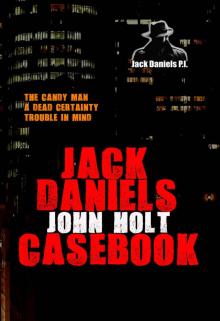 Jack Daniels - Casebook
Jack Daniels - Casebook A Case Of Murder (Kendall Book 6)
A Case Of Murder (Kendall Book 6)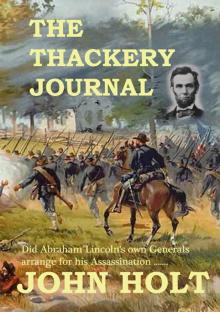 The Thackery Journal
The Thackery Journal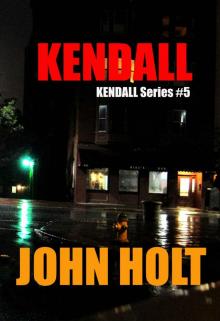 Kendall (Kendall Book 5)
Kendall (Kendall Book 5) Kendall - Private Detective - Box Set
Kendall - Private Detective - Box Set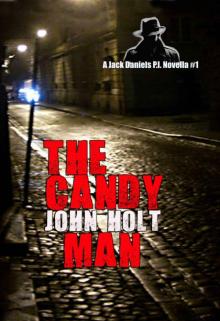 The Candy Man: A Jack Daniels P.I. Novella #1
The Candy Man: A Jack Daniels P.I. Novella #1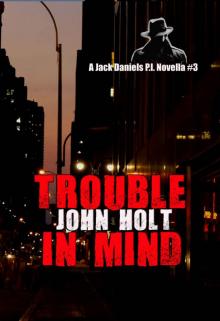 Trouble In Mind: Jack Daniels P.I. Novella #3
Trouble In Mind: Jack Daniels P.I. Novella #3 The Kammersee Affair
The Kammersee Affair